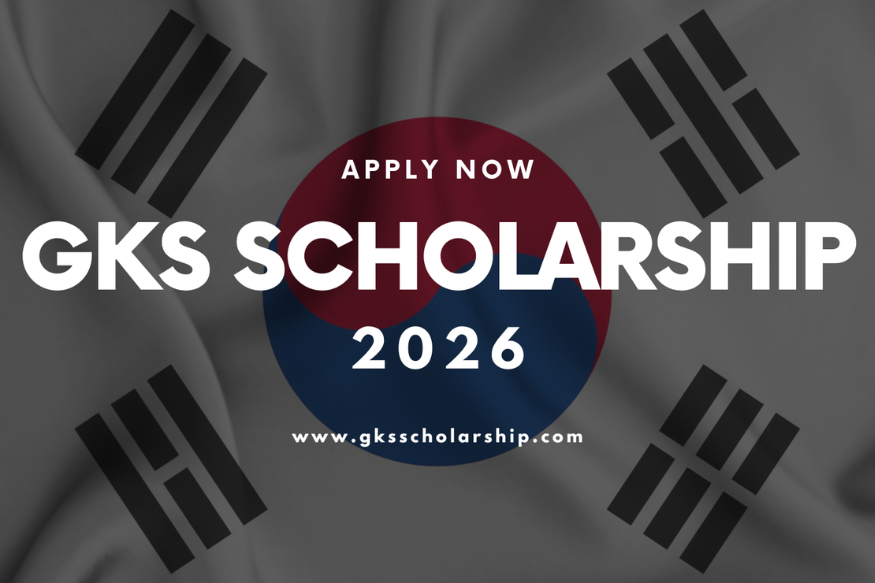
Are you an Indian student dreaming of studying in South Korea for free? The Global Korea Scholarship (GKS) 2026 can turn your dream into reality!
South Korea is known for its world-class education system and vibrant culture. Through the GKS Scholarship, the Korean Ministry of Education offers fully-funded undergraduate and postgraduate degrees to meritorious international students, including from India.
In this blog, we’ll break down everything you need to know about the GKS Scholarship 2026, including eligibility, benefits, application steps, and participating universities.
What is the Global Korea Scholarship (GKS)?
Launched in 2010 by Korea’s Ministry of Education, the Global Korea Scholarship (formerly KGSP – Korean Government Scholarship Program) aims to:
- Promote international exchange in education
- Strengthen Korea’s ties with participating countries
- Attract talented students to top South Korean universities
For Indian students, there are 78 scholarship slots in 2026, split into:
- University Track – 50 slots
- Embassy Track – 28 slots
Benefits of GKS Scholarship for Indian Students 2026
The GKS program is fully funded, meaning zero education cost & maximum support. Below are the benefits Indian students will receive:
- Round-trip airfare (economy class)
- Full tuition waiver (up to KRW 5 million per semester)
- Monthly living stipend:
- Undergrad: KRW 1,000,000+
- Postgrad: KRW 1,200,000+
- Health insurance
- Settlement & research allowance
- Korean Language Training for 1 year
- Korean proficiency incentive – up to KRW 100,000/month (for TOPIK holders)
- Degree completion grants
- Publication printing fees (For research degrees and Ph.D.)
Fun fact: You even get help with your TOPIK (Test of Proficiency in Korean) application fee!
GKS 2026: Course Duration
| Program | Duration |
|---|---|
| Master’s Degree | 3 Years (including 1 year of language course) |
| Doctoral Degree | 4 Years |
| Undergraduate Degree | 5 to 7 Years |
GKS Scholarship 2026 Eligibility for Indian Students
To apply for the scholarship, make sure you meet these criteria:
1. Citizenship
- Must be an Indian citizen
- Parents cannot be Korean citizens
2. Age Limit
- Under 40 years (born after September 1, 1986)
3. Education Qualifications
- Undergraduate applicants: Must have completed 12th grade
- Postgraduate applicants: Must hold a Bachelor’s or Master’s degree
4. Academic Performance
Must meet one of the following in your previous degree:
- 80% or above on a 100-point scale
- Top 20% of your class
- CGPA:
- 2.64/4.0
- 2.80/4.3
- 2.91/4.5
- 3.23/5.0 or higher
5. Medical Fitness
- Medically and mentally fit to study abroad
Types of GKS Programs: Embassy Track vs University Track
Embassy Track
- Apply via the Korean Embassy in India
- You are allowed to apply to 3 universities
- Embassy conducts interviews and forwards selected applications to NIIED
University Track
- Apply directly to a Korean university
- Recommend only one university
- University nominates you to NIIED
Tip: Some universities are part of both Embassy and University tracks. Read the guidelines carefully before applying.
GKS 2026: Key Dates (Tentative)
| Application Opens | February 2026 |
|---|---|
| Application Deadline | Varies by track (Feb–April 2026) |
| Result Declaration | June–July 2026 |
| Session Starts | September 2026 |
List of Required Documents for GKS 2026
Prepare the following documents:
- Proof of Indian citizenship (Passport or Aadhar)
- Academic transcripts & degree certificates
- Recommendation letters (max 2)
- Personal Statement & Study Plan
- English/Korean Proficiency Results (TOEFL / IELTS / TOPIK)
- Medical Assessment Form
- Awards, certificates, volunteer work (optional but recommended)
Note: All documents must be translated into English or Korean and notarized.
Top Universities in South Korea under GKS Program
Here are some notable Korean universities participating in 2026:
| Category | University Name |
|---|---|
| A | Seoul National University |
| A | KAIST |
| A | Yonsei University |
| A | Korea University |
| A | POSTECH |
| A | Ewha Womans University |
| A | Hanyang University |
| A | Sogang University |
| B | Chonnam National University |
| B | Pusan National University |
There are over 60 universities you can choose from. Each has different quotas and requirements.
How to Apply for GKS Scholarship 2026?
You can apply via Embassy Track or University Track:
Embassy Track:
- Visit the Korean Embassy in India website
- Download the GKS application form
- Submit all required documents
- Appear for the interview (if shortlisted)
- Final selection by NIIED
University Track:
- Choose a participating GKS university
- Apply directly on their admission portal
- Universities nominate students to NIIED
- Await final approval from NIIED
GKS 2026 – Selection Process
The GKS Scholarship is highly competitive and merit-based. Selection stages include:
- Document screening
- Interview (Embassy Track only)
- Nomination to NIIED
- Final decision by NIIED
Final Thoughts
The Global Korea Scholarship (GKS) 2026 is a life-changing opportunity for Indian students to pursue world-class higher education for free in South Korea. Whether you’re aiming for a bachelor’s, master’s, or Ph.D., this scholarship covers all major expenses.
If you’re passionate about Korean culture and academics, start preparing now — February 2026 is just around the corner!
Have any doubts?
Drop your questions in the comments or contact our expert counselors to guide you through the application process.
FAQs (People Also Ask)
Q. Can I apply for GKS without TOPIK or IELTS?
Yes, but having proof of English/Korean proficiency gives you an advantage.
Q. How many students from India are selected for GKS each year?
In 2026, 78 slots are allotted for Indian students.
Q. Is there an age limit for PhD applicants for GKS?
Yes, the age limit is 40 years for all programs.


